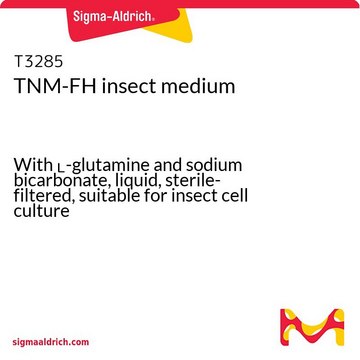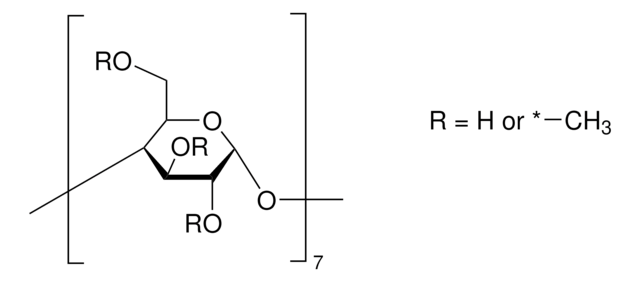T3160
TC-100 Insect Medium
With L-glutamine and sodium bicarbonate, liquid, sterile-filtered, suitable for insect cell culture
Sinónimos:
BML-TC/10
Iniciar sesiónpara Ver la Fijación de precios por contrato y de la organización
About This Item
Productos recomendados
sterility
sterile-filtered
form
liquid
technique(s)
cell culture | insect: suitable
components
glucose: 1.0 g/L
L-glutamine: 0.6 g/L
NaHCO3: 0.35 g/L
shipped in
ambient
storage temp.
2-8°C
¿Está buscando productos similares? Visita Guía de comparación de productos
General description
TC-100 Insect Medium has been developed to optimize the production of Autographica californica nuclear polyhedrosis virus (NPV) virions by cells from the fall armyworm, Spodoptera frugiperda. It has been found to support the growth of cells derived from a variety of lepidopteran species. The medium is mostly employed in the growth of baculoviruses in lepidopteran cell lines.
Application
For baculovirus culturing in lepidoptera.
TC-100 Insect Medium has been used:
- in the transfection of insect cells in suspension for efficient baculovirus generation
- to harvest Varroa destructor saliva
- as a starter media to culture and maintain insect cells such as Spodoptera frugiperda
also commonly purchased with this product
Referencia del producto
Descripción
Precios
Storage Class
12 - Non Combustible Liquids
flash_point_f
Not applicable
flash_point_c
Not applicable
Elija entre una de las versiones más recientes:
¿Ya tiene este producto?
Encuentre la documentación para los productos que ha comprado recientemente en la Biblioteca de documentos.
Los clientes también vieron
S Roest et al.
MethodsX, 3, 371-377 (2016-05-26)
Baculovirus (BV) mediated insect cell expression system utilizes transfection as a first step to introduce recombinant baculovirus DNA into insect cells. Many labs are still relying on the conventional liposome based transfection method in adherent culture. Here we describe a
Yi Zhang et al.
Journal of economic entomology, 112(2), 505-514 (2018-09-17)
The Varroa destructor (Acari Varroidae) mite is a serious threat to honey bee due to hemolymph feeding and virus transmission. Mite salivary proteins are involved in these interactions. However, the salivary secretome has not been previously characterized. In this paper
Nuestro equipo de científicos tiene experiencia en todas las áreas de investigación: Ciencias de la vida, Ciencia de los materiales, Síntesis química, Cromatografía, Analítica y muchas otras.
Póngase en contacto con el Servicio técnico





